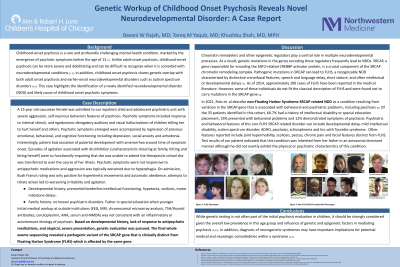Child and Adolescent Psychiatry
Session: Poster Session
(030) Genetic Workup of Childhood Onset Psychosis Reveals Novel Neurodevelopmental Disorder: A Case Report

Trainee Involvement: Yes

Bavani W. Rajah, MD (she/her/hers)
Assistant Clinical Professor of Psychiatry and Behavioral Sciences
Vanderbilt University Medical Center
Nashville, Tennessee, United States
Tareq M. Yaqub, MD
Attending Child Psychiatrist; Medical Director Psychiatric Acute Care Services
Ann and Robert H. Lurie Children's Hospital of Chicago
Chicago, Illinois, United States
Khushbu Shah, MD, MPH
Child & Adolescent Psychiatry Attending; Medical Director Psychiatric Acute Care Services
Ann and Robert H. Lurie Children's Hospital of Chicago
Chicago, Illinois, United States
Presenting Author(s)
Co-Author(s)
Background/Significance: Given the association of genetic factors and early onset schizophrenia, there is a need to report on pediatric phenotypes with a known genetic risk factor to facilitate earlier detection, guide treatment, and improve clinical outcomes (Gejman et al., 2010). In 2021, Rots et. al described a novel genetic neurodevelopmental condition resulting from variation in the SRCAP gene that is associated with behavioral and psychiatric problems, including psychosis. This case highlights the identification of a likely pathogenic variant as the cause of childhood onset psychotic symptoms and the unique child-parent dyad who share this genetic finding but vastly different phenotypic presentations. Conclusions/Implications: While genetic testing is not often part of the initial psychosis evaluation in children, it should be strongly considered given the overall low prevalence in this age group and influence of genetic and epigenetic factors in mediating psychosis.
Case: 15 year old caucasian female was admitted to our inpatient psychiatric unit with features of psychosis including response to internal stimuli, auditory and visual hallucinations, severe aggression and self injurious behaviors. Psychotic symptoms had been present for over a year and were accompanied by regression of previous cognitive functioning, and cessation of pubertal development. Developmental history notable for premorbid borderline intellectual functioning and motor milestone delays. Family history was insignificant for psychiatric disorders, however the father had required special education when he was younger. Initial medical workup was not consistent with an inflammatory or autoimmune etiology of psychosis. Based on developmental history, lack of response to antipsychotic medications and severe presentation, genetic evaluation was pursued.
Discussion: The final exome sequencing revealed a pathogenic variant of the SRCAP gene that is clinically distinct from Floating Harbor Syndrome (FHS) which is affected by the same gene. Psychiatric and behavioral features of this non-FLHS SRCAP mediated disorder can include developmental delay, mild intellectual disability, autism spectrum disorder, ADHD, psychosis, schizophrenia and tics with Tourette syndrome. Other features reported include joint hypermobility, scoliosis, pectus, chronic pain and facial features distinct from FHS. Test results indicated that this condition was inherited from her father in an autosomal dominant manner although he did not exhibit the physical or psychiatric characteristics of this condition.
References:

